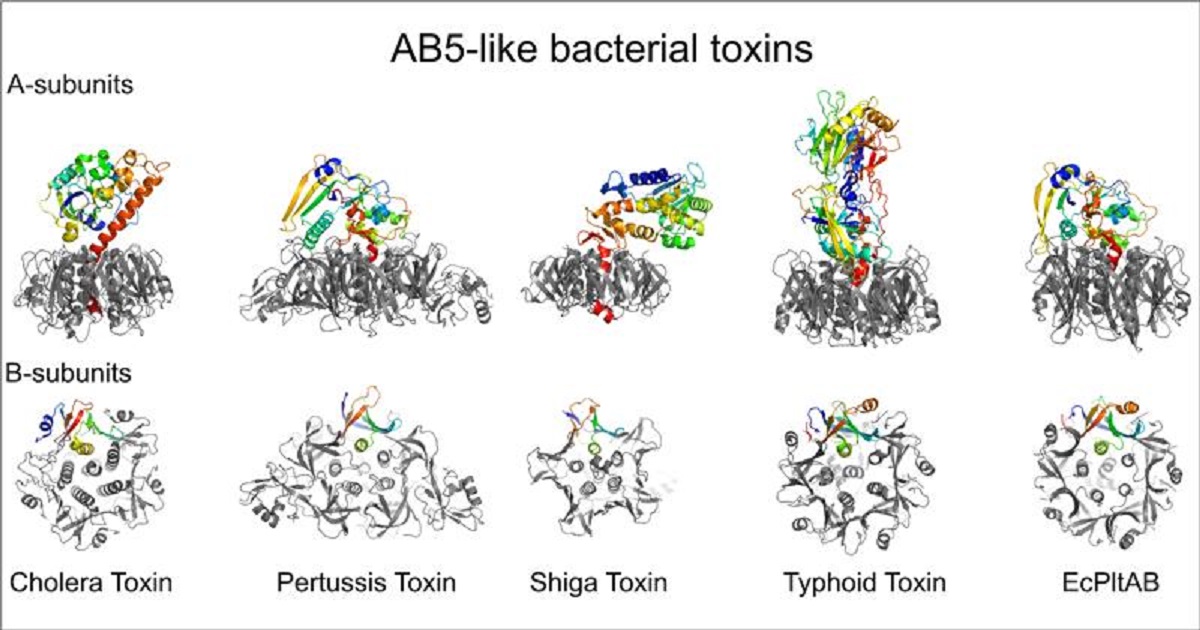The AB5 Toxin Family: Implications and Applications
A special issue of Toxins (ISSN 2072-6651). This special issue belongs to the section "Bacterial Toxins".
Deadline for manuscript submissions: 28 February 2026 | Viewed by 157

Special Issue Editors
Interests: AB5 toxins; engineering biology; healthcare tools; synthetic biology
Interests: AB5 toxins; engineering biology; healthcare tools; synthetic biology
Special Issue Information
Dear Colleagues,
AB5 toxins comprise a structurally conserved but functionally diverse family of bacterial exotoxins implicated in major diseases such as cholera, whooping cough, and typhoid. These toxins are typically composed of a toxic A-subunit and a homopentameric B-pentamer (B5) that enable host cell entry. The B5 subunit targets extracellular glycolipids, facilitating the delivery of the A-subunit into host cells, where it disrupts cellular processes. Classical AB5 members include cholera toxin (CT), Shiga toxin (ST), and heat-labile enterotoxins (LTs). Additionally, pertussis toxin (PT) has a heteromeric B-pentamer, and typhoid toxin has an A₂B₅ configuration. More recently, novel homologs such as ArtAB (Salmonella Typhimurium, 2017) and the B-subunit-only YpeB (Yersinia pestis, 2022) have expanded the known repertoire of these toxins. Beyond pathogenesis, AB5 toxins are being repurposed for healthcare, including the targeting of cancer cells, vaccine delivery, and neuronal cell tracing. How these classical proteins and their diverse homologs impact disease processes and can be tailored to treatment applications is of growing importance to the research and healthcare communities. This Special Issue will cover established and recently found AB5 protein family members, new discoveries regarding their implications in disease, and novel uses in biotechnology.
Dr. James Ross
Prof. Dr. Michael E. Webb
Prof. Dr. Bruce Turnbull
Guest Editors
Manuscript Submission Information
Manuscripts should be submitted online at www.mdpi.com by registering and logging in to this website. Once you are registered, click here to go to the submission form. Manuscripts can be submitted until the deadline. All submissions that pass pre-check are peer-reviewed. Accepted papers will be published continuously in the journal (as soon as accepted) and will be listed together on the special issue website. Research articles, review articles as well as short communications are invited. For planned papers, a title and short abstract (about 100 words) can be sent to the Editorial Office for announcement on this website.
Submitted manuscripts should not have been published previously, nor be under consideration for publication elsewhere (except conference proceedings papers). All manuscripts are thoroughly refereed through a double-blind peer-review process. A guide for authors and other relevant information for submission of manuscripts is available on the Instructions for Authors page. Toxins is an international peer-reviewed open access monthly journal published by MDPI.
Please visit the Instructions for Authors page before submitting a manuscript. The Article Processing Charge (APC) for publication in this open access journal is 2700 CHF (Swiss Francs). Submitted papers should be well formatted and use good English. Authors may use MDPI's English editing service prior to publication or during author revisions.
Keywords
- AB5 toxins
- targeted delivery
- bacterial toxins
Benefits of Publishing in a Special Issue
- Ease of navigation: Grouping papers by topic helps scholars navigate broad scope journals more efficiently.
- Greater discoverability: Special Issues support the reach and impact of scientific research. Articles in Special Issues are more discoverable and cited more frequently.
- Expansion of research network: Special Issues facilitate connections among authors, fostering scientific collaborations.
- External promotion: Articles in Special Issues are often promoted through the journal's social media, increasing their visibility.
- Reprint: MDPI Books provides the opportunity to republish successful Special Issues in book format, both online and in print.
Further information on MDPI's Special Issue policies can be found here.








